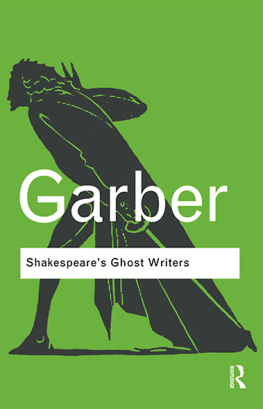Giles Block
SPEAKING
THE SPEECH
An Actors Guide to Shakespeare
Foreword by Mark Rylance

NICK HERN BOOKS
London
www.nickhernbooks.co.uk
Contents
Appendix:
My Comments on the Duologue in Chapter 7 |
To Penny and Sam
With love, and ever thanks
I knew when seven Justices could not take up a quarrel, but when the parties were met themselves, one of them thought but of an if; as if you said so, then I said so: and they shook hands, and swore brothers. Your if, is the only peace-maker: much virtue in if.
Touchstone, As You Like It: Act 5, Scene 4
Foreword
Mark Rylance
I think we speak like a speedboat careering across a deep loch. So many different forces are at work to create the way we speak. Memories alone are constantly rising up or pulling us down. Stuff we have read rises high all around us. Stuff we have experienced too rears up like mountain peaks. Creating or simulating all those forces spontaneously, as we speak Shakespeare, is the difficult work of the actor, and is expressed through the sound of the word and the little silences thereby accentuated.
I heard wonderful verse-speakers at the RSC when I was growing up. Judi Dench particularly comes to mind. She always sounded so natural, so present. I gradually realised that there were different styles of speaking. Some were very musical or impressive. I came to love it most when the person sounded like a person I might meet off the stage in the actual world. I then grew interested in the relationship, off the stage, between my thinking and speaking and realised that, while I always had a genuine need to speak about a certain subject, I rarely knew how I was going to express myself until I was doing so and even then my mind got distracted as different connected subjects appeared. Only if I quoted someone did I know what I was going to say, or if I had waited a long time to say what I wanted to say. How to achieve this discovered sound of speech and yet honour the verse became a concern.
People sometimes ask me how I learn the lines, but forgetting them is the real work. Forgetting what you are going to say next, so you discover the text as you would your own thoughts.
Of course the next question was the relationship between my thoughts and the wordless desires that give them form. Anyway, all these considerations made me suspicious of conscious verse-speaking. I feared it would kill spontaneity and liveliness and innocence. I found that directors were happy with the way I spoke, on the whole, if I found the meaning and the need to speak. With Shakespeare the lines are written so naturally that the true sense usually leads you to the accurate verse. So I muddled along.
But, in the back of my mind, I was unsettled. The author had clearly taken enormous trouble to place some lines in verse and some in prose. Why? Should one not treat the verse differently therefore from the prose? What was different? The line endings, rhymes, and rhythm: why was the author using these rhetorical forms? Would they just look after themselves?
Still, I was wary of rules and laws about verse-speaking. One director told me the rules were meant for the actors in the ensemble, who might not have the talent of the leads, but if they followed the rules they would all be the same and of a certain standard. I wonder if this was just a trick to make the leads sound better. Why shouldnt every character be as true as each other? Does Shakespeare treat any of the characters with less humanity? Does nature?
I told myself that laws are only formed when love has ceased; that if I loved the language, if I listened to it, thought about it, I would find my way without the need for law.
It was about that time, when I was forty, that I met Giles Block, and I knew he loved the language more than I did and therefore knew what I needed to know.
I have always been fascinated by the working relationship in theatre between the director and the actor. I have witnessed some directors empower an actor to play and others, without necessarily meaning to, disempower an actor. When I have directed and acted myself, I have also experienced this first-hand. As soon as I became Artistic Director at Shakespeares Globe Theatre, I copied the ballet companies I knew of, and introduced an hour three times a week, which was devoted to the actors skills; movement, voice, and the words, verse and prose. Directors of Shakespeare know about these things, but they have a more important responsibility for the story and the audience; and I felt that we as actors should turn up for rehearsal, as ballet dancers do, with our skills ready. Many actors would come to us with little or distant experience of the dreaded verse-speaking. Also, with Shakespeares plays, we are working with such an exquisite consciousness of words and rhythm and expression, that a space to share what we all perceived seemed essential. I needed a particular person to lead this work, as I did not want the actors disempowered by a strict set of laws, or a teacher-student relationship, or an atmosphere where the actors own experience was discounted in favour of the leader of the work. I also did not want the directors to feel challenged or disempowered by another voice working directly with the actors on their lines. On the contrary, I wanted the directors to feel liberated, particularly in the final weeks of a production, when they are very concerned with the whole production, by knowing there was a pair of ears solely focused on the liveliness and accuracy of the actors speaking: the Master of the Word.
Giles was the perfect Master of the Word. I remember saying to the company that he was a master not of slaves or of a particular skill, he was master because of the quality of his love for Shakespeares words. Giles never offended any director or actor to my knowledge. He survived my time as Artistic Director of Shakespeares Globe and works closely with Dominic Dromgoole, the Globes current AD, to this day. He is priceless.
When he directed me in the last production of Hamlet I did, at the Globe, he revealed to me the additions to the text he thought Burbage had made when playing Hamlet, and which had been considered so good that the creators of the First Folio had included them in that edition of the play. This was fascinating evidence of the aural nature of the plays; how they may have developed in the actors hands; in their sense of the vernacular. In my experience, Giles only ever offers options and choices when carefully going through the text together with the actors, but you gradually realise the witty and close attention Shakespeare pays to the way people speak at different points in their emotional and thoughtful lives. You also become aware of how Shakespeares writing changed to reflect his growing awareness of how people actually speak and his growing confidence in making the literal form serve the natural force.
The greatest delights of working with Giles is his coloured scripts, which one receives as soon as one starts to run the play in the rehearsal room, and then throughout previews. In a careful handwriting with marks and symbols, and a bright fluorescent colour, Giles tells you where you went wrong on the words, circling, writing out the misquote, sometimes suggesting a different stress, if so, always with a Lets talk next to it. If you make the same mistake the next time, the same symbol or remark is made in a different fluorescent colour. I can achieve rainbows on some pages before I get it right.
Giles deepened my love for Shakespeare and for the way we all speak. I trust you will have a similar experience reading his book.
Authors Note
The First Folio of 1623
Next page






